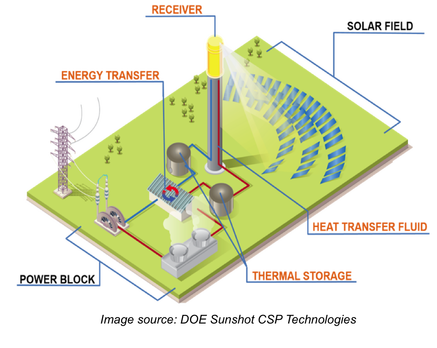Thermal Energy Storage
The thermodynamic efficiency of power cycles driven by concentrated solar power can be improved by increasing the working fluid operating temperature. Effective heat transfer and storage media can hence positively impact the performance and dispatchability of electricity produced from concentrated solar power. For the next generation (Gen 3) of concentrated solar power systems to integrate with supercritical carbon dioxide Brayton cycles, operational temperatures exceeding 700 °C are anticipated. However, the typically used nitrate salts (solar salt), become unstable at these temperatures. Therefore, the development of alternative heat transfer media for high temperature thermal energy storage applications is an ongoing challenge. To this end, we are interested in characterizing the performance of heat-transfer fluids at elevated temperatures of operation that are compatible with the Gen 3 concentrated solar power technologies.

